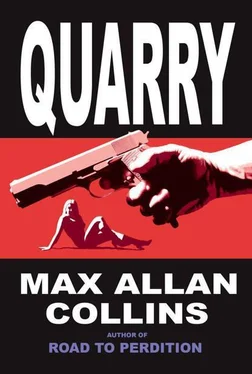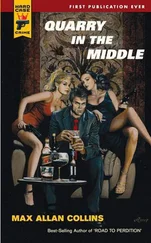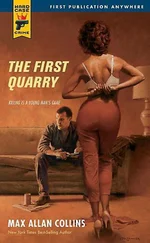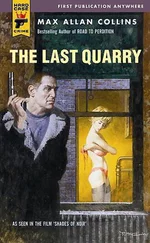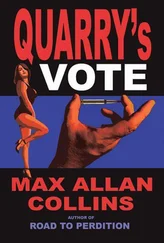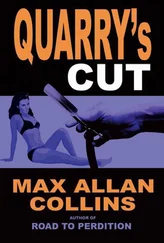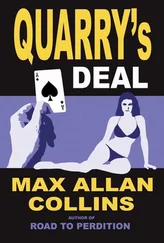Max Collins - Quarry
Здесь есть возможность читать онлайн «Max Collins - Quarry» весь текст электронной книги совершенно бесплатно (целиком полную версию без сокращений). В некоторых случаях можно слушать аудио, скачать через торрент в формате fb2 и присутствует краткое содержание. Жанр: Криминальный детектив, на английском языке. Описание произведения, (предисловие) а так же отзывы посетителей доступны на портале библиотеки ЛибКат.
- Название:Quarry
- Автор:
- Жанр:
- Год:неизвестен
- ISBN:нет данных
- Рейтинг книги:4 / 5. Голосов: 1
-
Избранное:Добавить в избранное
- Отзывы:
-
Ваша оценка:
- 80
- 1
- 2
- 3
- 4
- 5
Quarry: краткое содержание, описание и аннотация
Предлагаем к чтению аннотацию, описание, краткое содержание или предисловие (зависит от того, что написал сам автор книги «Quarry»). Если вы не нашли необходимую информацию о книге — напишите в комментариях, мы постараемся отыскать её.
Quarry — читать онлайн бесплатно полную книгу (весь текст) целиком
Ниже представлен текст книги, разбитый по страницам. Система сохранения места последней прочитанной страницы, позволяет с удобством читать онлайн бесплатно книгу «Quarry», без необходимости каждый раз заново искать на чём Вы остановились. Поставьте закладку, и сможете в любой момент перейти на страницу, на которой закончили чтение.
Интервал:
Закладка:
“I’m going to feel like a fool,” I said. “A stranger coming around at a time like this.”
“You’re not a fool and you’re not a stranger, you’re my escort and shut up about it.”
I was glad to shut up about it. Peg’s asking me along had saved me from having to fish for an invitation from her. So far I’d managed to pump her for a lot of information without making myself seem overly curious, and now I was getting inside the Springborn house, again without causing any suspicion on Peg’s part or hopefully on anyone else’s. What better way to get inside the Springborn place than to come with a friend of the family, with the rest of Albert Leroy’s mourners. It beat hell out of breaking-and-entering.
My knock was answered by an attractive woman in her mid-forties. She was slender, her graying black hair pulled back in a neat bun; she wore a flowing but conservative black dress which came down to her knees in a straight and waistless line. Her face was smooth, the skin pulled almost tight, while her neck was heavily creped, indicating a probable face-lift. Her features were intelligent and well-formed, her eyes widespread and alert. She smiled at Peg and nodded, an artificial smile with pain in it, or the semblance of pain, as though she wanted to make sure we knew that she was distraught but in control.
“Thank you for coming,” she said, her voice a steady contralto, and she reached for Peg’s hand, squeezed it and gave it back.
Peg said, “I’m so sorry about all this, Linda Sue. This must be a horrible time for you and Ray.”
She nodded gravely, then looked at me and arched an eyebrow. “I’m somewhat confused today, in the aftermath of this tragedy… I must admit I can’t seem to recall your friend, Peg… you’ll have to excuse my rudeness…”
“This is Mr. Quarry. He’s not a native of Port City, but he’s a close friend of mine and was with me when I got the news about Albert. I didn’t think you’d mind if he accompanied me.”
“Of course not,” she said. “I only wish we’d been able to meet under more pleasant circumstances, Mr. Quarry. Won’t the two of you come in, please.”
We stepped inside and were standing in a hallway that could have been a ballroom, what with its empty impressive size, or perhaps a chapel for some strict Protestant sect, what with all its austere dark wood. The most striking thing in the otherwise vacant hallway was a deep polished wood stairway that curved down from a darkened second floor.
“May I take your coat, Mr. Quarry?”
I gave her the raincoat, having since removed the nine-millimeter automatic and left it in the trunk of the Ford. I felt somewhat naked in this house without the gun, not knowing precisely what kind of confrontations I might be having in here, but it seemed less than wise to tote around the murder weapon of Albert Leroy in the home of his mourning relatives. My uneasiness was amplified by the draftiness of the hallway; it was cool in here, centrally air-conditioned I supposed, an uncomfortable, morgue-like coolness.
Linda Sue Springborn said, “Will you join us in the drawing room, Mr. Quarry?” She motioned to a doorless archway to her left. “Raymond’s in the den waiting for you, Peg.” She smiled and said, “I understand you’re going to discuss business matters. I’m glad you are, that will make things easier for Raymond, get his mind off this very depressing day.”
Peg nodded, smiled at Mrs. Springborn, smiled apologetically at me, pressed my hand, and disappeared through the French doors opposite the archway.
I followed Mrs. Springborn into the drawing room. She said, “Make yourself at home,” and left me to fend for myself. I found a chair in the corner and sat. I was sitting before I realized I was the only person doing so. The other twenty-some people in the room were standing around, trying to look mournful, none of them taking advantage of the chairs and several davenports. I looked around the room and understood.
It was a nice room to visit but you wouldn’t want to live there. It was one of those rooms full of chairs you don’t sit in, tables you don’t set things down on or pick things up off, with bookcases full of leather-bound volumes you don’t read, and a fireplace you don’t burn wood in and a grand piano you don’t play. The walls in here, though, were not the cheerless dark wood of the hallway but a rather pleasant pastel green satin-paper; this was offset by deadly dull paintings stuck here and there, full of meadows where horses postured stiffly and trees seemed made of green and brown plaster.
Mrs. Springborn circulated, like a hostess at a reception, and periodically remembered the occasion, alternating a sad sideways shake of her head with an up-anddown nod, both of which I took to represent her restrained sorrow. No one spoke above a whisper unless they were speaking with Mrs. Springborn and never once did I hear Albert Leroy’s name mentioned. I had the distinct feeling Albert Leroy could have walked into the room unnoticed. I had the odd notion that I was the only person in the room who had really known Albert Leroy, the only person who had played any meaningful part in his life, the only one who viewed Albert’s death with at least some importance.
This went on for an hour. Sometimes, the room had so little motion the whole thing could’ve been a painting, and as dull and lethargic a painting as the landscapes on the walls. I was getting thirsty, in spite of the coolness of the room, and must’ve swallowed several times, in a dry sort of way, because Linda Sue Springborn came over after a while and stage-whispered, “Could you use a drink of water?” And she winked.
Suddenly I liked her better.
I smiled and said, “Yes, I sure could use a drink of water.”
I followed her out of the room and through the hallway into a room that was obviously used for living and not display, with a couch in front of a television and a soft lounge chair next to a table strewn with magazines and paperbacks. From there she led me through a smaller drawing room, not as lived in as the previous room but not as much a museum as the other drawing room, either. Off of that was a small overblown closet of a room, a small study with a desk and one wall of books and three walls of awards and photos relating to the Kitchen Korner radio program. “ My den,” she said. “Not near so large as Raymond’s, but I need my privacy as much as he does. Maybe more.”
She went to the bookcase where in the middle a space was reserved for a cluster of bottles and glasses, which made for a small but sufficient liquor supply. She said, “Sorry, no ice,” and poured me a shot of Scotch as though she knew that was what I wanted. It was. She made herself a hasty gin and tonic and had it down before I’d even sipped my Scotch.
“You take that like it’s medicine,” I said.
“Exactly what it is,” she said. “A transfusion for an anemic soul.” She smiled. She was rather pretty, in a plastic-surgery sort of way. Her eyes were hazel. “How glad I am for a stranger to talk to. Someone I don’t have to play games with.”
“Oh?”
“I didn’t love my brother, Mr. Quarry. He was a burden in life and he’s a burden in death.”
“Those words sound cold even to a stranger’s ears, Mrs. Springborn.”
“Well…” She made a face, and there was sadness in it somewhere. “It isn’t true to say I didn’t love my brother… I used to love him… I loved him before he became irrational… before he became a hermit… he was a bright man once, Mr. Quarry, maybe a genius, near it anyway… but he had a mental breakdown, was given shock treatment, which was maybe a mistake because afterwards… he was a vegetable. Tell me, Mr. Quarry, how do you mourn a potato?” She laughed, then abruptly the laughing turned to choking and her eyes teared. She brushed away the wetness and fixed herself another drink. She could mix a gin and tonic as fast as I’ve seen one made. She could down them with the best of us, too. “There’s something in your face that makes me feel I can be open like this with you, Mr. Quarry. And Peg, she’s a good girl, a smart girl. She’s a little wild sometimes, but I don’t think she’d bring one of her casual shack-ups along with her. She must think well of you to bring you along.”
Читать дальшеИнтервал:
Закладка:
Похожие книги на «Quarry»
Представляем Вашему вниманию похожие книги на «Quarry» списком для выбора. Мы отобрали схожую по названию и смыслу литературу в надежде предоставить читателям больше вариантов отыскать новые, интересные, ещё непрочитанные произведения.
Обсуждение, отзывы о книге «Quarry» и просто собственные мнения читателей. Оставьте ваши комментарии, напишите, что Вы думаете о произведении, его смысле или главных героях. Укажите что конкретно понравилось, а что нет, и почему Вы так считаете.
